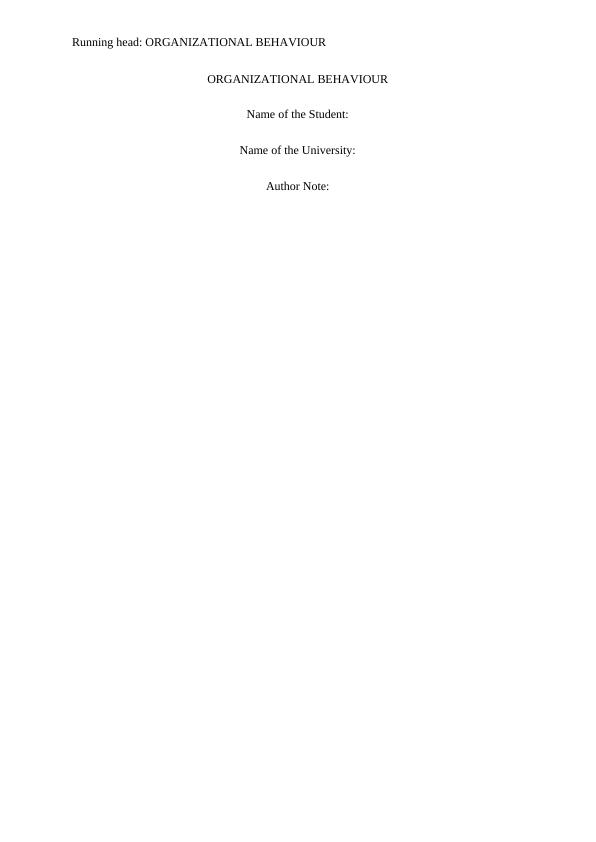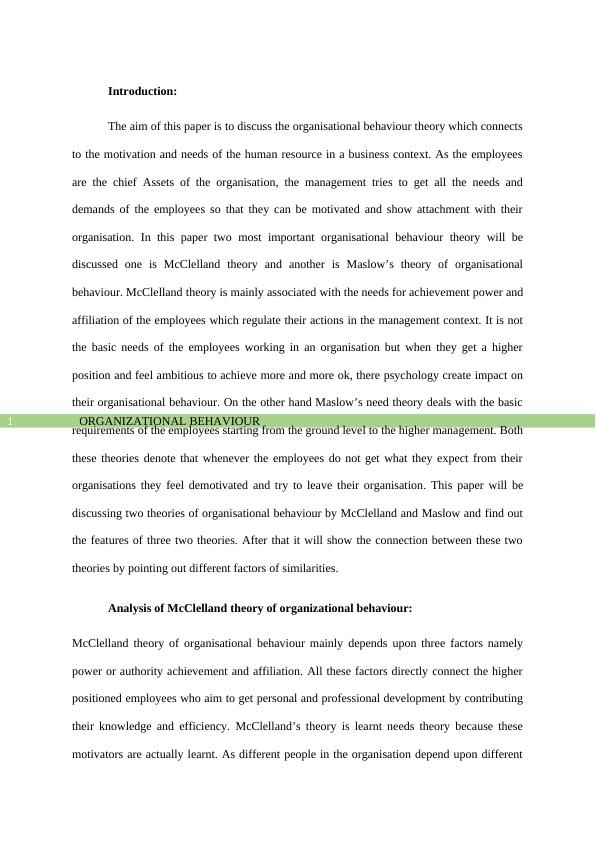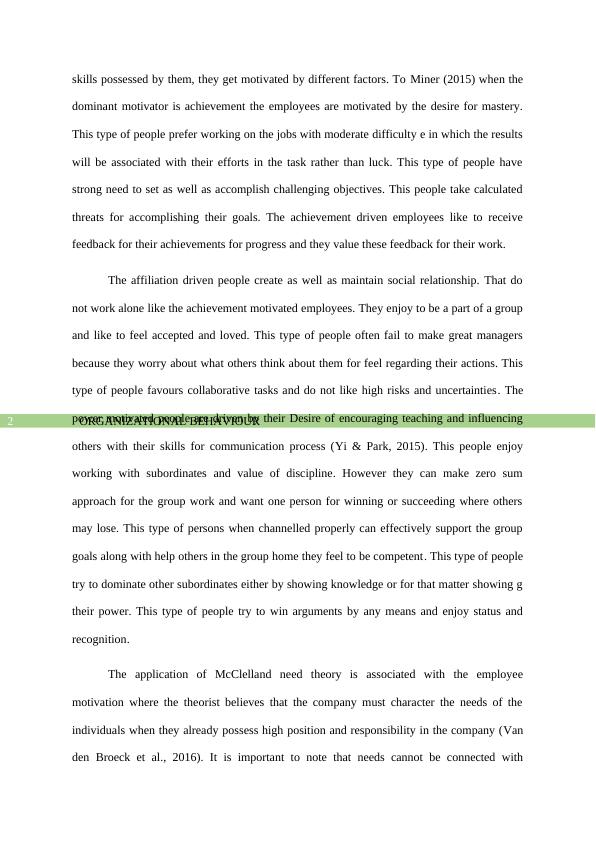Organizational Behaviour: McClelland and Maslow's Theory
Added on 2022-12-26
10 Pages2610 Words1 Views
Running head: ORGANIZATIONAL BEHAVIOUR
ORGANIZATIONAL BEHAVIOUR
Name of the Student:
Name of the University:
Author Note:
ORGANIZATIONAL BEHAVIOUR
Name of the Student:
Name of the University:
Author Note:

ORGANIZATIONAL BEHAVIOUR1
Introduction:
The aim of this paper is to discuss the organisational behaviour theory which connects
to the motivation and needs of the human resource in a business context. As the employees
are the chief Assets of the organisation, the management tries to get all the needs and
demands of the employees so that they can be motivated and show attachment with their
organisation. In this paper two most important organisational behaviour theory will be
discussed one is McClelland theory and another is Maslow’s theory of organisational
behaviour. McClelland theory is mainly associated with the needs for achievement power and
affiliation of the employees which regulate their actions in the management context. It is not
the basic needs of the employees working in an organisation but when they get a higher
position and feel ambitious to achieve more and more ok, there psychology create impact on
their organisational behaviour. On the other hand Maslow’s need theory deals with the basic
requirements of the employees starting from the ground level to the higher management. Both
these theories denote that whenever the employees do not get what they expect from their
organisations they feel demotivated and try to leave their organisation. This paper will be
discussing two theories of organisational behaviour by McClelland and Maslow and find out
the features of three two theories. After that it will show the connection between these two
theories by pointing out different factors of similarities.
Analysis of McClelland theory of organizational behaviour:
McClelland theory of organisational behaviour mainly depends upon three factors namely
power or authority achievement and affiliation. All these factors directly connect the higher
positioned employees who aim to get personal and professional development by contributing
their knowledge and efficiency. McClelland’s theory is learnt needs theory because these
motivators are actually learnt. As different people in the organisation depend upon different
Introduction:
The aim of this paper is to discuss the organisational behaviour theory which connects
to the motivation and needs of the human resource in a business context. As the employees
are the chief Assets of the organisation, the management tries to get all the needs and
demands of the employees so that they can be motivated and show attachment with their
organisation. In this paper two most important organisational behaviour theory will be
discussed one is McClelland theory and another is Maslow’s theory of organisational
behaviour. McClelland theory is mainly associated with the needs for achievement power and
affiliation of the employees which regulate their actions in the management context. It is not
the basic needs of the employees working in an organisation but when they get a higher
position and feel ambitious to achieve more and more ok, there psychology create impact on
their organisational behaviour. On the other hand Maslow’s need theory deals with the basic
requirements of the employees starting from the ground level to the higher management. Both
these theories denote that whenever the employees do not get what they expect from their
organisations they feel demotivated and try to leave their organisation. This paper will be
discussing two theories of organisational behaviour by McClelland and Maslow and find out
the features of three two theories. After that it will show the connection between these two
theories by pointing out different factors of similarities.
Analysis of McClelland theory of organizational behaviour:
McClelland theory of organisational behaviour mainly depends upon three factors namely
power or authority achievement and affiliation. All these factors directly connect the higher
positioned employees who aim to get personal and professional development by contributing
their knowledge and efficiency. McClelland’s theory is learnt needs theory because these
motivators are actually learnt. As different people in the organisation depend upon different

ORGANIZATIONAL BEHAVIOUR2
skills possessed by them, they get motivated by different factors. To Miner (2015) when the
dominant motivator is achievement the employees are motivated by the desire for mastery.
This type of people prefer working on the jobs with moderate difficulty e in which the results
will be associated with their efforts in the task rather than luck. This type of people have
strong need to set as well as accomplish challenging objectives. This people take calculated
threats for accomplishing their goals. The achievement driven employees like to receive
feedback for their achievements for progress and they value these feedback for their work.
The affiliation driven people create as well as maintain social relationship. That do
not work alone like the achievement motivated employees. They enjoy to be a part of a group
and like to feel accepted and loved. This type of people often fail to make great managers
because they worry about what others think about them for feel regarding their actions. This
type of people favours collaborative tasks and do not like high risks and uncertainties. The
power motivated people are driven by their Desire of encouraging teaching and influencing
others with their skills for communication process (Yi & Park, 2015). This people enjoy
working with subordinates and value of discipline. However they can make zero sum
approach for the group work and want one person for winning or succeeding where others
may lose. This type of persons when channelled properly can effectively support the group
goals along with help others in the group home they feel to be competent. This type of people
try to dominate other subordinates either by showing knowledge or for that matter showing g
their power. This type of people try to win arguments by any means and enjoy status and
recognition.
The application of McClelland need theory is associated with the employee
motivation where the theorist believes that the company must character the needs of the
individuals when they already possess high position and responsibility in the company (Van
den Broeck et al., 2016). It is important to note that needs cannot be connected with
skills possessed by them, they get motivated by different factors. To Miner (2015) when the
dominant motivator is achievement the employees are motivated by the desire for mastery.
This type of people prefer working on the jobs with moderate difficulty e in which the results
will be associated with their efforts in the task rather than luck. This type of people have
strong need to set as well as accomplish challenging objectives. This people take calculated
threats for accomplishing their goals. The achievement driven employees like to receive
feedback for their achievements for progress and they value these feedback for their work.
The affiliation driven people create as well as maintain social relationship. That do
not work alone like the achievement motivated employees. They enjoy to be a part of a group
and like to feel accepted and loved. This type of people often fail to make great managers
because they worry about what others think about them for feel regarding their actions. This
type of people favours collaborative tasks and do not like high risks and uncertainties. The
power motivated people are driven by their Desire of encouraging teaching and influencing
others with their skills for communication process (Yi & Park, 2015). This people enjoy
working with subordinates and value of discipline. However they can make zero sum
approach for the group work and want one person for winning or succeeding where others
may lose. This type of persons when channelled properly can effectively support the group
goals along with help others in the group home they feel to be competent. This type of people
try to dominate other subordinates either by showing knowledge or for that matter showing g
their power. This type of people try to win arguments by any means and enjoy status and
recognition.
The application of McClelland need theory is associated with the employee
motivation where the theorist believes that the company must character the needs of the
individuals when they already possess high position and responsibility in the company (Van
den Broeck et al., 2016). It is important to note that needs cannot be connected with

End of preview
Want to access all the pages? Upload your documents or become a member.
Related Documents
Theories of Motivation and How to Apply Them in the Modern Workplacelg...
|10
|2046
|150
Organisational Behaviour Question Answer 2022lg...
|11
|2239
|20
Organisational Dynamics and Behaviour: Theories and Modelslg...
|8
|2126
|160
Organizational Behaviour: A Case Study of Myers, Australialg...
|16
|4468
|481
Theories of Motivation and How to Apply Them in the Modern Workplacelg...
|9
|2203
|416
Motivation Theories for Modern Workplace: Maslow, Hertzberg, and McClellandlg...
|9
|2032
|361
